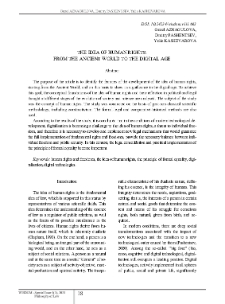Օբյեկտ
Վերնագիր: The Idea of Human Rights: From the Ancient World to the Digital Age
Ամսագրի կամ հրապարակման վերնագիր:
Հրապարակման ամսաթիվ:
Հատոր:
Համար:
ISSN:
Համատեղ հեղինակները:
Խ․ Աբովյանի անվան հայկական պետական մանկավարժական համալսարան
Ծածկույթ:
Ամփոփում:
The purpose of the article is to identify the features of the development of the idea of human rights, starting from the Ancient World, and on this basis to show its significance in the digital age. To achieve this goal, the conceptual foundations of the idea of human rights and their reflection in political and legal thought at different stages of the evolution of society and science are analysed. The subject of the study was the concept of human rights. The study was conducted on the basis of post-non-classical scientific methodology, including constructivism. The formal-legal and comparative-historical methods are also used. According to the results of the study, it is concluded that in the conditions of modern technological development, digitalisation is becoming a challenge to the idea of human rights, a threat to individual freedom, and therefore it is necessary to develop and implement new legal mechanisms that would guarantee the full implementation of fundamental rights and freedoms, provide the necessary balance between individual freedom and public security. In this context, the legal consolidation and practical implementation of the principle of formal equality become important.
Հրատարակության վայրը:
Երևան
Հրատարակիչ:
Ձևաչափ:
Նույնացուցիչ:
oai:arar.sci.am:370990
Լեզու:
Օբյեկտի հավաքածուներ:
Վերջին անգամ ձևափոխված:
Oct 8, 2025
Մեր գրադարանում է սկսած:
Mar 12, 2024
Օբյեկտի բովանդակության հարվածների քանակ:
60
Օբյեկտի բոլոր հասանելի տարբերակները:
https://arar.sci.am/publication/400877
Ցույց տուր նկարագրությունը RDF ձևաչափով:
Ցույց տուր նկարագրությունը OAI-PMH ձևաչափով։
-
Իմաստություն=Wisdom=Мудрость
-
Իմաստություն, 2013, N 1
-
Իմաստություն, 2014, N 1 (2)
-
Իմաստություն, 2014, N 2 (3)
-
Իմաստություն, 2015, N 1 (4)
-
Wisdom, 2015, N 2 (5)
-
Wisdom, 2016, N 1 (6)
-
Wisdom, 2016, N 2 (7)
-
Wisdom, 2017, N 1 (8)
-
Wisdom, 2017, N 2 (9)
-
Wisdom, 2018, N 1 (10)
-
Wisdom, 2018, N 2 (11)
-
Wisdom, 2019, N 1 (12)
-
Wisdom, 2019, N 2 (13)
-
Wisdom, 2020, N 1 (14)
-
Wisdom, 2020, N 2 (15)
-
Wisdom, 2020, N 3 (16)
-
Wisdom, 2021, N 1 (17)
-
Wisdom, 2021, N 1 (1) Special issue
- Editorial board
- Contents
- Editor`s Foreword
- Epistemological Aspects of the Organisation of Human Activity in the Transition from Disparate Social Techniques to Societal Technologies
- The Idea of Human Rights: From the Ancient World to the Digital Age
- The Principle of Deliberation as a Key Basis of Statehood in Modern Russia
- The Aesthetic Doctrine of Law (Aesthetics of Law) in the Context of the Development of NBICS Technologies
- The Phenomenological Method in the Ethics and Legal Philosophy of the XX Century
- Genesis and Historical Sense of the Motto “Liberté, Égalité, Fraternité”
- Some Methodological Problems of Preventing Crimes Against Political Rights in Modern Democratic States (Philosophy-Legal Dimension)
- The Legal Status of an Individual in Russian Scientific, Political and Legal Doctrines
- The Influence of the Ruling Elite on Political Activity in the Conditions of Destructuring the Essence of the Philosophy of Law
- The Conventional Nature of Legal Values
- Axiological Aspect of Legal Consequential Thought of the Late 18th – Early 20th Centuries
- Mythologisation of Law by Historical Consciousness
- Dialectics of Philosophical Pillars of the Law and Development Doctrine
- Value and Regulatory Foundations for Digital Transformation of Modern Social Relations: Theological and Conservative Legal Aspects
- Development of English Legal Positivism from Bentham to Salmond and Brown: Leading Ideas in the Context of the Common Law Tradition
- Private and Public Interests in Russian Law and Jurisprudence: Transformation of Approaches
- Legal Theology in Interdisciplinary Discourse
- V. S. Nersesyants’ Political and Legal Ideas about the Rule of Law State and Their Reflection in the Constitution of the Russian Federation and the Constitution of the Republic of Armenia
- Philosophical Foundations for Understanding the System of Law
- Law and Logic: E. Bulygin’s Deductive Pattern of Judicial Reasoning
- Philosophical and Legal Foundations of the Comprehensive Theory of Law
- The Sociocultural Context in Law: Modernism - Postmodernism - Metamodernism
- Authors
-
Wisdom, 2021, N 2 (18)
-
Wisdom, 2021, N 3 (19)
-
Wisdom, 2021, N 4 (20)
-
Wisdom, 2022, N 1 (21)
-
Wisdom, 2022, N 1 (2) Special issue
-
Wisdom, 2022, N 2 (22)
-
Wisdom, 2022, N 2 (3) Special issue
-
Wisdom, 2022, N 3 (23)
-
Wisdom, 2022, N 3 (4) Special issue
-
Wisdom, 2022, N 4 (24)
-
Wisdom, 2023, N 1 (25)
-
Wisdom, 2023, N 2 (26)
-
Wisdom, 2023, N 3 (27)
-
Wisdom, 2023, N 4 (28)
-
Wisdom, 2024, N 1 (29)
-
Wisdom, 2024, N 2 (30)
-
Իմաստություն, 2013, N 1
| Հրատարակության անուն | Ամսաթիվ |
|---|---|
| Aznagulova, Guzel, The Idea of Human Rights: From the Ancient World to the Digital Age | Oct 8, 2025 |





